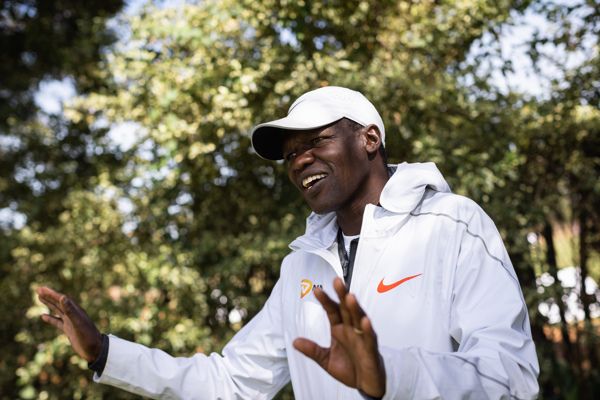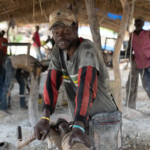My name is Patrick Sang, a former athlete and now coaching the likes of Faith Kipyegon, the two-time Olympic champion and two-time world champion, and Eluid Kipchoge, the greatest marathoner that we know, amongst so many other great runners.
I have been coaching now for more than 20 years and I’ve mentored and guided people to so many title, world records, Olympic titles, world championship titles, commonwealth titles.
My career highlight is what actually made history – having Eluid run under two hours in the INEOS Project. My career in sport started at the college level. I was running for the University of Texas. Later I polished myself and managed to represent my country in the championships, and managed to the two times silver in the world championships and one time silver in the Olympics.
Now, I am enjoying another phase of athletics which is coaching. Having cases like Faith going through motherhood and coming back and doing better than before. Those are things that – the day I hang up my stopwatch and whistle, I’ll reminisce and enjoy what I’ve seen go through my hands.
What is really interesting – and this is one of the aspects that we need to look at – is that the education level of most of the athletes that we have is something. We need to look at more of the technical aspects and probably the infrastructural aspects.
It takes time to know how a certain athlete responds to training. I will explain a training plan, but it is the way that they execute that plan that gives you an idea of whether that person has confidence. You can see that by the way they try to set goals, whether they are realistic or abnormal. You can ask an athlete where they see themselves in the future. Many will respond by saying I see myself as a world champion.
Everyone wants to be a world champion, but is this person internalising everything that is required to be a world champion? When it comes to assessing execution, when you give somebody a set of tasks, the way they execute the tasks tells you how confident they are about themselves because it is about application. If they cannot apply themselves it probably means they lack the understanding or they don’t understand so much about themselves.
To help an athlete psychologically you need to bring them to the level where they understand themselves very well, and you need to understand that person very well. Where the two meets is a point of convergence, is when you will have succeeded. You will have the confidence that this person will carry out every task you set them with conviction. This is the point a goal moved from the utopian to the realistic.
Learning about a human being is a process. Sometimes you are lucky to have a strong-willed athlete that doesn’t require much input and when you tell them something they learn very fast. That process does not takes one day, one week or one year, it is a long process.

Even today I learn a lot about myself being a trainer. I learned a lot from the Nike Breaking 2 project by the way Eliud (Kipchoge) was so convinced he was going to run under two hours. Even in training you could see he was going to do it mentally. It takes a long time (to discover those skills) and I am still learning.
The young athletes in camp learn so much from the likes of Eliud and Faith, these young ones have a lot because they can see how both athletes prepare. It becomes similar to the case of the child and the mother, when the child is born they rely so much on another person and that dependency helps them know their surroundings and how to relate to people. It is the same with athletes. Eliud and Faith give athletes in the camp an opportunity to see how to conduct themselves and how to perform at the top level.

I would say the psychology of coaching is very important, it makes a big difference in performance, even the orientation towards training. If you do not prepare the athletes psychologically, training will not be achieved in an optimal way. So why the psychology of coaching? We all come from different mindsets and backgrounds and our backgrounds determine how we face all our challenges.
We then each face up to these challenges in different degrees of competence. If you were raised as submissive, it takes time to develop self-confidence. When you are training someone of that nature – even if exceptionally talented – it is important to work on that psychology side. Talent alone will achieve a maximum return of 70 per cent, but if you work on psychology an athlete will end up performing at 90 to 100 per cent on their potential – that is the difference.
















